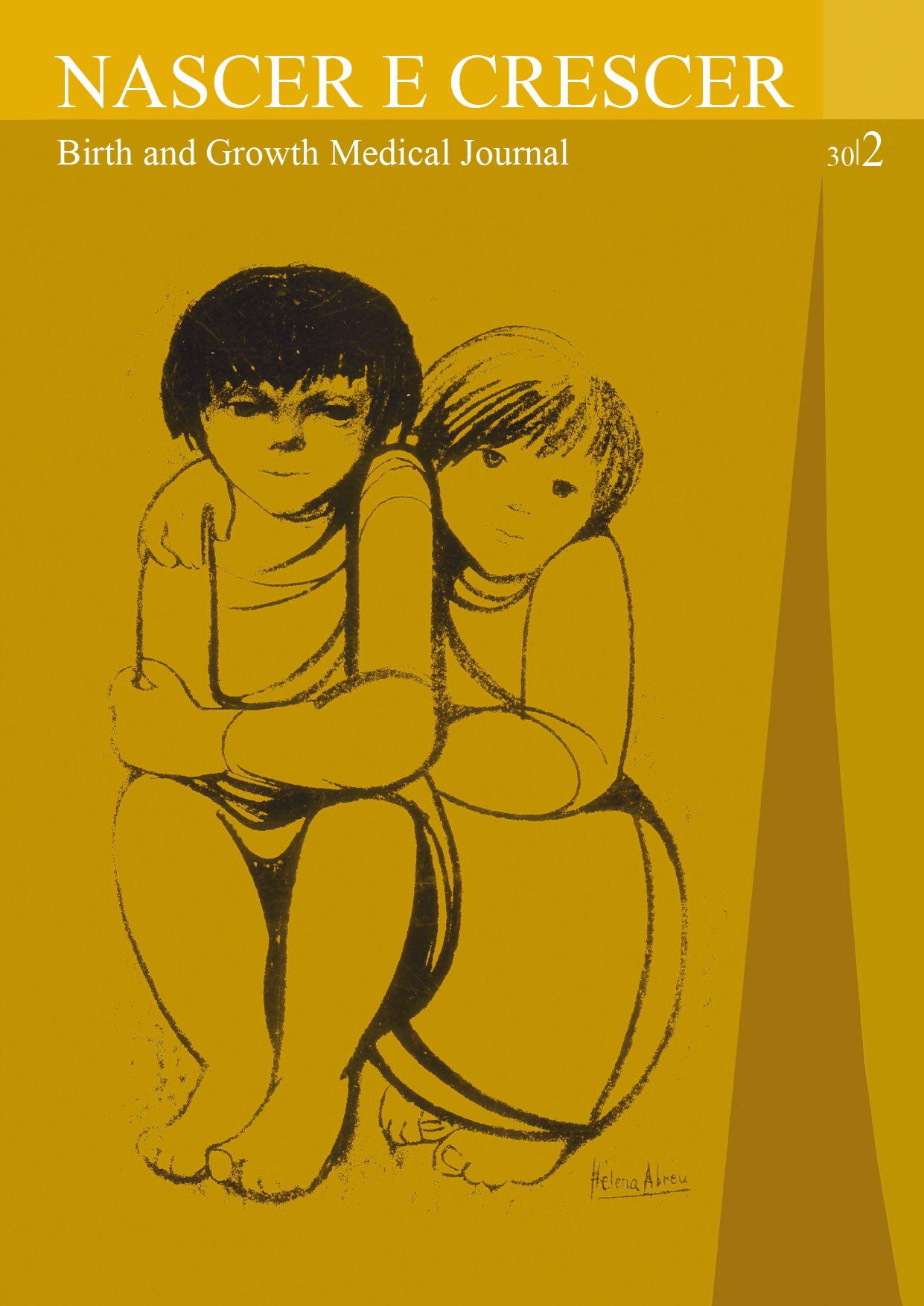Apoio parental e competência parental percecionada − estudo de perceções parentais numa unidade pedopsiquiátrica de primeira infância
DOI:
https://doi.org/10.25753/BirthGrowthMJ.v30.i2.20443Palavras-chave:
apoio parental, competência parental percecionada, perceção parental, primeira infânciaResumo
Introdução: A Competência Parental Percecionada (PSE) tem sido associada a comportamentos parentais positivos e, consequentemente, promotores do bem-estar e desenvolvimento harmonioso da criança. A identificação dos seus potenciais determinantes continua a ser um foco de atenção em saúde mental ao avaliar as perceções e cognições parentais ou ao planear intervenções com os mesmos.
Materiais/Métodos: Este foi um estudo transversal com uma amostra clínica de uma Unidade de Pedopsiquiatria da Primeira Infância. Todos os pais de crianças avaliadas pela primeira vez foram incluídos e preencheram o questionário de Sentimento de Competência Parental (Parenting Sense of Competence); tradução portuguesa, α=0.75-0.83) e duas perguntas sobre a perceção de apoio recebido pelo outro progenitor e pela família de origem. Foram corretamente preenchidos 34 questionários. A perceção média de competência parental foi comparada entre ambos os pais e foi testada a correlação com as perceções de apoio. A análise estatística foi efetuada no software SPSS® versão 21 através de análise descritiva e correlação de dados (t-test e Pearson r).
Resultados: Um total de 34 questionários foram preenchidos. O Sentimento de Competência Parental não diferiu significativamente entre pai e mãe (73.44 vs 72.24, p=0.533). Os pais percecionam-se como mais apoiados, quer pela família de origem (5.09 vs 4.2, p=0.001), quer pelas mães (4.9 vs 4.09, p=0.011). Foi identificada no pai uma correlação positiva entre o Sentimento de Competência Parental e o Sentimento de Apoio pela Família de Origem (Pearson r=0.639, p<0.01).
Conclusão: Entre as mães, as perceções de apoio não se correlacionaram com o sentimento de competência parental. Contudo, a correlação encontrada entre os pais enfatiza como a respetiva família de origem poderá influenciar a tríade relacional. As perceções de apoio parental deverão ser exploradas ao considerar as relações horizontais intrafamiliares como um potencial mecanismo de influência das relações verticais, pela sua associação com a competência parental percecionada.
Downloads
Referências
Sevigny PR, Loutzenhiser L. Predictors of parenting self-efficacy in mothers and fathers of toddlers. Child Care Health Dev. 2010; 36:179-89.
Jones TL, Prinz RJ. Potential roles of parental self-efficacy in parent and child adjustment: a review. Clin Psychol Rev. 2005; 25:341-63.
Montigny F, Lacharité C. Perceived parental efficacy: concept analysis. J Adv Nurs 2005; 49:387–96.
Johnston C, Mash E. A measure of parenting satisfaction and efficacy. Journal of Clinical Child Psychology. 1989; 18:167-75.
Rikka K, Chloé L, Sari A. Parent’s Psychological Well-being and parental self-efficacy in relation to the family’s triadic interaction. Infant Mental Health J. 2015; 36:298–307.
Chau V, Giallo R. The relationship between parental fatigue, parenting self-efficacy and behaviour: implications for supporting parents in the early parenting period. Child Care Health Dev. 2015; 41:626–33.
Kohlhoff J, Barnett B. Parenting self-efficacy: Links with maternal depression, infant behaviour and adult attachment. Early Human Development. 2013; 89:249–56.
Cutrona CE, Troutman BR. Social support, infant temperament, and parenting self-efficacy: a mediational model of postpartum depression. Child Dev.1986; 57:1507-18.
Zohreh A, Tahmassian K, Ali Mazaheri M. Parental Self-Efficacy as a Determining Factor in Healthy Mother-Child Interaction: A Pilot Study in Iran. Iran J Psychiatry Behav Sci. 2014; 8.
Zeanah CH, Lieberman A. Defining Relational Pathology in Early Childhood: The Diagnostic Classification of Mental Health and Developmental Disorders of Infancy and Early Childhood DC:0-5 Approach. Infant Ment Health J. 2016; 37:509-20.
Ferreira B, Veríssimo M, Santos AJ, Fernandes C, Cardoso J. Escala de Sentimento de Competência Parental: Análise confirmatória do modelo de medida numa amostra de pais portugueses. Laboratório de Psicologia. 2011; 9:147-55.
Coleman K, Karraker K. Self-Efficacy and Parenting Quality: Findings and Future Applications. Developmental Review. 1998; 18.
Davies PT, Cummings EM, Winter MA. Pathways between profiles of family functioning, child security in the interparental subsystem, and child psychological problems. Dev Psychopathol. 2004; 16:525-50.
McHale J, Fivaz-Depeursinge E. Understanding triadic and family group process during infancy and early childhood. Clinical Child and Family Psychology Review. 1999; 2:107-27.
Downloads
Publicado
Como Citar
Edição
Secção
Licença
Direitos de Autor (c) 2021 Catarina Garcia Ribeiro, Pedro Dias, Ivo Peixoto, Rita Ganhoto, Salomé Silva, Pedro Caldeira da Silva

Este trabalho encontra-se publicado com a Creative Commons Atribuição-NãoComercial 4.0.
Copyright e Direitos dos Autores
Todos os artigos publicados na Revista Nascer e Crescer – Birth and Growth Medical Journal são de acesso aberto e cumprem os requisitos das agências de financiamento ou instituições académicas. Relativamente à utilização por terceiros a Nascer e Crescer – Birth and Growth Medical Journal rege-se pelos termos da licença Creative Commons "Atribuição - Uso Não-Comercial - (CC-BY-NC)"".
É da responsabilidade do autor obter permissão para reproduzir figuras, tabelas, etc. de outras publicações.
Juntamente com a submissão do artigo, os autores devem enviar a Declaração de conflito de interesses e formulário de autoria. Será enviado um e-mail ao autor correspondente, confirmando a receção do manuscrito.
Os autores ficam autorizados a disponibilizar os seus artigos em repositórios das suas instituições de origem, desde que mencionem sempre onde foram publicados e de acordo com a licença Creative Commons.


